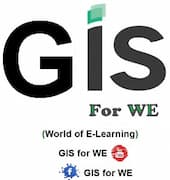IDW Tool in ArcToolbox
أداة IDW
ArcMap ArcGIS
IDW Tool,
Raster Interpolation Toolset, 3D Analyst Toolbox
IDW
Interpolates a raster
surface from points using an inverse distance weighted (IDW) technique.
يقحم السطح النقطي من النقاط باستخدام تقنية قياس المسافة العكسية (IDW).
1. Input point features
The input point features containing the z-values to be
interpolated into a surface raster.
معالم نقطة الإدخال التي تحتوي على قيم z المراد استيفائها في خطوط المسح السطحي.
2. Z value field
The field that holds a height or magnitude value for each point.
This can be a numeric field or the Shape field if the input point
features contain z-values.
الحقل الذي يحتوي على قيمة ارتفاع أو مقدار لكل نقطة.
يمكن أن يكون هذا حقلاً رقميًا أو حقل الشكل إذا كانت معالم نقطة الإدخال تحتوي على قيم z.
3. Output raster النقطية الإخراج
The output interpolated surface raster.
It is always a floating-point raster.
الناتج محرف النقطية السطحية.
إنها دائمًا نقطية عائمة.
4. Output cell size (optional) حجم خلية الإخراج (اختياري)
The cell size of the output raster that will be created.
This parameter can be defined by a numeric value or obtained from
an existing raster dataset. If the cell size hasn't been explicitly specified
as the parameter value, the environment cell size value will be used if
specified; otherwise, additional rules will be used to calculate it from the
other inputs. See the usage for more detail.
حجم خلية البيانات النقطية الناتجة التي سيتم إنشاؤها.
يمكن تحديد هذه المعلمة بقيمة عددية أو الحصول عليها من مجموعة بيانات نقطية موجودة. إذا لم يتم تحديد حجم الخلية بشكل صريح كقيمة المعلمة ، فسيتم استخدام قيمة حجم خلية البيئة إذا تم تحديدها ؛ خلاف ذلك ، سيتم استخدام قواعد إضافية لحسابها من المدخلات الأخرى. انظر الاستخدام لمزيد من التفاصيل.
5. Power (optional) قوة (اختياري)
The exponent of distance.
Controls the significance of surrounding points on the
interpolated value. A higher power results in less influence from distant
points. It can be any real number greater than 0,
but the most reasonable
results will be obtained using values from 0.5 to 3. The default is 2.
أس المسافة.
يتحكم في أهمية النقاط المحيطة على القيمة المحرفة. ينتج عن القوة الأعلى تأثير أقل من النقاط البعيدة. يمكن أن يكون أي رقم حقيقي أكبر من 0 ،
ولكن سيتم الحصول على النتائج الأكثر منطقية باستخدام قيم من 0.5 إلى 3. القيمة الافتراضية هي 2.
6. Search radius (optional) نصف قطر البحث (اختياري)
Defines which of the input points will be used to interpolate the
value for each cell in the output raster.
There are two options: Variable and Fixed. Variable is the
default.
·
Variable
Uses a variable search radius in order to find a specified number
of input sample points for the interpolation.
oNumber of points—An integer value specifying the
number of nearest input sample points to be used to perform interpolation. The
default is 12 points.
oMaximum distance—Specifies the distance, in map
units, by which to limit the search for the nearest input sample points. The
default value is the length of the extent's diagonal.
·
Fixed
Uses a specified fixed distance within which all input points will
be used for the interpolation.
oDistance—Specifies the distance as a radius
within which input sample points will be used to perform the interpolation.
The value of the radius is expressed in map units. The default
radius is five times the cell size of the output raster.
oMinimum number of points—An integer defining the
minimum number of points to be used for interpolation. The default value is 0.
If the required number of points is not found within the specified
distance, the search distance will be increased until the specified minimum
number of points is found.
When the search radius needs to be increased it is done so until
the Minimum number of points fall within that radius, or the extent of the
radius crosses the lower (southern) and/or upper (northern) extent of the
output raster. NoData is assigned to all locations that do not satisfy the
above condition.
يحدد أي من نقاط الإدخال سيتم استخدامه لاستيفاء القيمة لكل خلية في البيانات النقطية للإخراج.
هناك خياران: متغير وثابت. المتغير هو الافتراضي.
· عامل
يستخدم نصف قطر بحث متغير من أجل العثور على عدد محدد من نقاط عينة الإدخال للاستيفاء.
o عدد النقاط - قيمة عدد صحيح تحدد عدد أقرب نقاط عينة الإدخال ليتم استخدامها لإجراء الاستيفاء. الافتراضي هو 12 نقطة.
o الحد الأقصى للمسافة — يحدد المسافة ، في وحدات الخريطة ، التي يتم من خلالها تحديد البحث عن أقرب نقاط عينة إدخال. القيمة الافتراضية هي طول قطري المدى.
· مثبت
يستخدم مسافة محددة يتم خلالها استخدام جميع نقاط الإدخال من أجل الاستيفاء.
المسافة - تحدد المسافة كنصف قطر سيتم استخدام نقاط العينة المدخلة خلاله لإجراء الاستيفاء.
يتم التعبير عن قيمة نصف القطر بوحدات الخريطة. نصف القطر الافتراضي هو خمسة أضعاف حجم خلية النقطية الناتجة.
o الحد الأدنى لعدد النقاط - عدد صحيح يحدد الحد الأدنى لعدد النقاط التي سيتم استخدامها في الاستيفاء. القيمة الافتراضية هي 0.
إذا لم يتم العثور على العدد المطلوب من النقاط ضمن المسافة المحددة ، فستتم زيادة مسافة البحث حتى يتم العثور على الحد الأدنى المحدد لعدد النقاط.
عندما يحتاج نصف قطر البحث إلى الزيادة ، يتم ذلك حتى يقع الحد الأدنى من النقاط داخل هذا الشعاع ، أو يتجاوز مدى نصف القطر النطاق السفلي (الجنوبي) و / أو العلوي (الشمالي) لخرج البيانات النقطية. يتم تعيين NoData لجميع المواقع التي لا تفي بالشرط أعلاه.
7. Input barrier polyline features (optional) ميزات حاجز متعدد الخطوط (اختياري)
Polyline features to be used as a break or limit in searching for
the input sample points.
يتم استخدام ميزات Polyline كفاصل أو حد في البحث عن نقاط عينة الإدخال.
اليك صفحه ومجموعة على الفيس بوك لتعلم أكثر بما يخص نظم المعلومات الجغرافية (GIS) و برنامج ArcGIS Pro من خلال هذه الروابط:





تعليقات
إرسال تعليق